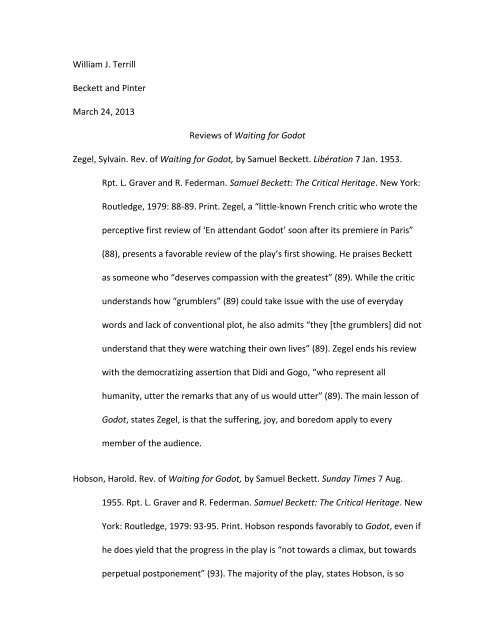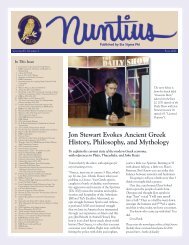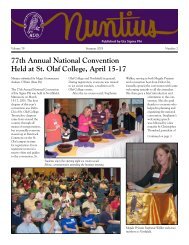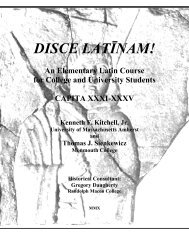Waiting for Godot
Waiting for Godot
Waiting for Godot
- No tags were found...
Create successful ePaper yourself
Turn your PDF publications into a flip-book with our unique Google optimized e-Paper software.
William J. TerrillBeckett and PinterMarch 24, 2013Reviews of <strong>Waiting</strong> <strong>for</strong> <strong>Godot</strong>Zegel, Sylvain. Rev. of <strong>Waiting</strong> <strong>for</strong> <strong>Godot</strong>, by Samuel Beckett. Libération 7 Jan. 1953.Rpt. L. Graver and R. Federman. Samuel Beckett: The Critical Heritage. New York:Routledge, 1979: 88-89. Print. Zegel, a “little-known French critic who wrote theperceptive first review of ‘En attendant <strong>Godot</strong>’ soon after its premiere in Paris”(88), presents a favorable review of the play’s first showing. He praises Beckettas someone who “deserves compassion with the greatest” (89). While the criticunderstands how “grumblers” (89) could take issue with the use of everydaywords and lack of conventional plot, he also admits “they [the grumblers] did notunderstand that they were watching their own lives” (89). Zegel ends his reviewwith the democratizing assertion that Didi and Gogo, “who represent allhumanity, utter the remarks that any of us would utter” (89). The main lesson of<strong>Godot</strong>, states Zegel, is that the suffering, joy, and boredom apply to everymember of the audience.Hobson, Harold. Rev. of <strong>Waiting</strong> <strong>for</strong> <strong>Godot</strong>, by Samuel Beckett. Sunday Times 7 Aug.1955. Rpt. L. Graver and R. Federman. Samuel Beckett: The Critical Heritage. NewYork: Routledge, 1979: 93-95. Print. Hobson responds favorably to <strong>Godot</strong>, even ifhe does yield that the progress in the play is “not towards a climax, but towardsperpetual postponement” (93). The majority of the play, states Hobson, is so
Terrill 2unconventional that many critics and most audience members do notunderstand its point. While Hobson believes that the play is basically about howhumanity always waits <strong>for</strong> tomorrow, and never realizes today as today, Becketthas “got it all wrong” (94). Opposed to Becett’s suggestion, Hobson stresses thathumanity is far to busy busying itself to be waiting <strong>for</strong> anything. He seems tomiss that Gogo and Didi attempt quite often to busy themselves, but to no avail.The truth to Beckett’s play, however, is besides the point, as “[t]here is no need<strong>for</strong> the dramatist to philosophize rightly; he can leave that to the philosophers”(94). Because of the “swagger” of Beckett’s philosophy and style, and theuniversality of the characters, Hobson urges his readers to see the play.Tynan, Kenneth. Rev. of <strong>Waiting</strong> <strong>for</strong> <strong>Godot</strong>, by Samuel Beckett. Observer 7 Aug. 1955.Rpt. L. Graver and R. Federman. Samuel Beckett: The Critical Heritage. New York:Routledge, 1979: 95-97. Print. Tynan reviews the play in a flattering light,suggesting that it “appeals to a definition of drama much more fundamentalthan any in the books” (95-6). The critic argues that <strong>Godot</strong> asserts and proves ina very simplistic and minimalistic style that “[p]assing the time in the dark, […] isnot only what drama is about but also what life is about” (96). Tynan goes on torelate the characters to Buster Keaton, Chaplin, and Laurel and Hardy, and thedialogue to “the double-talk of vaudeville” (96). To Tynan, the play <strong>for</strong>ces areexamination of the rules of drama, one that he is fully willing to embrace.Fraser, G.S. Rev. of <strong>Waiting</strong> <strong>for</strong> <strong>Godot</strong>, by Samuel Beckett. Times Literary Supplement 10
Terrill 3Feb. 1956. Rpt. L. Graver and R. Federman. Samuel Beckett: The Critical Heritage.New York: Routledge, 1979: 97-104. Print. Fraser presents a favorable andexpansive review of <strong>Godot</strong>, asserting that the play is a “modern morality play, onpermanent Christian themes” (100). In his symbolist analysis that follows, Fraserdraws parallels between the characters and all fallen Christians, between theyoung boy(s) and God’s angels, and between the tree in the play and a wholenumber of tree in the Bible (Tree of Knowledge, Tree of Life, Tree of Judas, andthe Cross). For Fraser, the play presents a very symbolic commentary of on theWestern world, which ultimately leaves the audience with a betterunderstanding of reality and the current state of Christianity.C.B. Rev. of <strong>Waiting</strong> <strong>for</strong> <strong>Godot</strong>, by Samuel Beckett. San Quentin News 28 Nov. 1957. Rpt.L. Graver and R. Federman. Samuel Beckett: The Critical Heritage. New York:Routledge, 1979: 111-113. Print. Though he notes that it presents no dramatizedmoral or specific hope, <strong>for</strong> the critic <strong>Godot</strong> is a very pleasurable play. C.B.explains how Beckett expects each member of the audience to “draw his ownconclusions, make his own errors” (111). In summation of his review, the mainvalue in <strong>Godot</strong> <strong>for</strong> the reviewer is that it is so universally applicable that nearlyeveryone watching can imagine himself in the play’s situation. He executes thispoint by going through each of the events of the play and suggesting theaudience draw a parallel to reality. Overall, the play is the only place to go, evenif it leaves you with nowhere to go; it was “effective” (113).
















